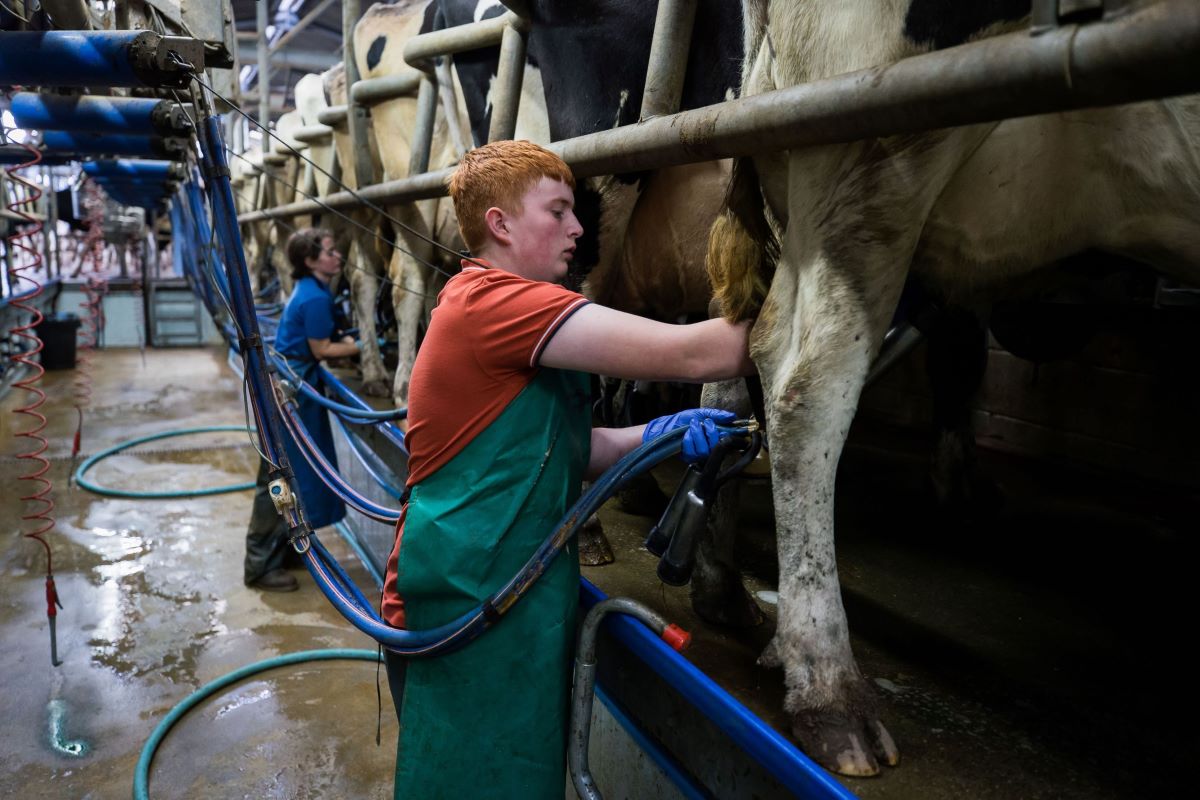What does a General Election year mean for FE and skills?

With the opinion polls indicating a return to power for the Labour Party – in what is an expected general election year – the skills policy analyst, Prof. Tom Bewick, makes some predictions about what the main party manifestos are likely to offer to a beleaguered FE and skills sector, that is short on cash and high on hope.
In 1996, Peter Mandelson and Roger Liddle published a book called, ‘The Blair Revolution: Can New Labour deliver?’.
At the time, the musings of these two close confidants of the Labour leader were seen as a comprehensive blueprint for what the party would do if it won the upcoming general election, held 1st May 1997.
Of course, we all know what happened next. But re-reading the book three decades on from Labour’s famous landslide victory, the narrative is remarkably similar on FE and skills, with perhaps one major exception. On page 89 discussing ‘opportunity and investment in skill’, the authors lament at what was typically the view towards training of the then ‘left-wing chattering classes.’
‘Next time I hear the Labour Party talking about training, I’m going to scream’, which Mandelson and Liddle said was the kind of comment a modernising Britain could well do without.
Back to the future
Fast forward to 2024, and you could say that talk about skills and how to improve productivity through investment in training is now taken up by nearly all the chattering classes, including the mainstream media.
As the next general election draws near, the link between skills and migration policy will perhaps never be so hotly contested between the main parties as the upcoming contest between Sunak and Starmer, as they battle it out for the position of the UK’s 58th Prime Minister.
Because the most depressing aspect of the New Labour blueprint, analysing it nearly 30 years on, is just how little progress – measured in objective economic terms – that skills policy has had on correcting many of the historical imbalances cited by commentators going back decades.
In the 1990s, we were trapped in a ‘low-wage, low-skills equilibrium’, yet, today, the position is not so different.
For example, read these selective quotes, from the 1996 book:
‘Concern has long been expressed about the poor level of understanding mathematical concepts among UK trainees.’
‘The absence of a proper structure of technical qualifications and certified training has been a particularly long-standing complaint.’
‘Further education colleges have been given the incentive to attract as many students and lay on as many courses as possible, without paying too much attention to quality, drop-out rates and inspection.’
‘British business has regarded money spent on training as a cost rather than an investment.’
What goes around comes around, as the old saying goes. And every single one of these quotes could be applied to the current FE and skills debate.
Part of the rationale for introducing the new Advanced British Standard (ABS) is to boost maths attainment up to 18, as well as to find a more integrated, mix and match approaches, in the upper secondary curriculum, for both A levels and T levels in future.
Despite hyper-active reforms of further education over three decades, colleges and independent providers still face similar complaints that securing ‘bums on seats’ have often trumped any concerted attempts to chime with national or local industrial strategies.
Depressingly, the sector probably stands just as accused of not being equipped to meet the country’s economic skills needs, just as it did in 1997. Critics point to the fact the skills shortage occupation list held by the Home Office has hardly changed in years.
Meanwhile, employers bemoan the skills gaps they face, while investing about half in workforce training as their counterparts in Europe.
Overall, it’s become a vicious cycle.
UK skills and productivity gap
Last summer, I wrote extensively about the UK skills and productivity gap in a report, ‘Running to Stand Still.’ It was a clarion call for a shift away from the declinist mentality that has dogged the country for too long.
The stark truth, for all the brilliant dedication of people who work in FE colleges and training providers, is that over a decade of skills policy and top-down schemes – predominantly cooked up in Whitehall – have failed to shift the dial on a flat-lining economy.
According to analysis by the Resolution Foundation, ‘real wages grew by 33 per cent a decade from 1970 to 2007’, but then stagnated closer to just 4 per cent since, ‘costing the average UK worker £10,700 per year in lost wage growth.’
The number of 18-year-olds in England not in any form of education, employment or training, stands at around 16 per cent – the highest figure since 2009 – according to the ONS. Overall, these public estimates suggest nearly three quarters of a million teenagers are currently inactive.
And all this at a time when record numbers of overseas students, eligible for work permits alongside their study visas, have come to the UK. Data from the government’s Migration Advisory Committee (MAC) shows that many of these individuals end up in low-paid non-graduate jobs.
As we go into the next UK general election – which will be at times a febrile debate between the parties – one can expect to see a more explicit link made between the jobs going to overseas workers, while domestic economic inactivity rates are set to reach a record high.
Such a challenge points to the need for coherent policies that can address, more holistically, the entire skills eco-system: worker productivity, welfare dependency and the migration issue.
What will the main party manifestos say?
Post-16 policy and funding is devolved in the United Kingdom. Manifestos rarely mention this political reality, often describing in broad generalities, ‘retail policies’ that all too often have only a limited writ beyond the English state. Apprenticeship is a good example of where policy diverges considerably, despite the Levy that finances the scheme being collected at a UK-wide level.
Conservatives
The Conservative Party are likely to pledge that they will achieve for skills, by 2030, what they have successfully done in government since 2010; by significantly raising school standards. The vaguely scoped out Advanced British Standard (ABS) will be put front and centre during their campaign as the answer to the country’s long-term skills deficits.
Despite real terms spending per pupil remaining fairly static in compulsory education since 2010, both reading and literacy skills at key stage 4 have improved markedly. Eventually, this will feed through to a higher quality workforce, the argument will run. The raising of the participation age (originally conceived by the last Labour government, but implemented in 2013), has also been a relative success, resulting in the number of 16- and 17-year-olds that are NEET, falling by a full percentage point (to 4.6%), according to the latest Labour Force Survey.
You can expect to read a Tory manifesto that will attempt to build on this record by suggesting that a world-class skills base can be attained by delivering on the Lifelong Learning (Higher Education Fee Limits) Act 2023, which is potentially quite revolutionary in helping individuals spread out the attainment and funding of higher-level skills over a working lifetime.
The big problem for the next government is that there is currently no comprehensive framework – regulatory or funding – to deliver on the scale of the LLE ambition. And the fact entitlements start at RQF level 4 and above, cuts out millions of ordinary workers who could benefit from a skills upgrade. Moreover, without a combination of maintenance grants and tuition loans, it is hard to see how the aims of the policy can ever be truly met.
Conservatives will push for further qualifications reform, such as the ABS idea that attempts to reverse many of the implementation flaws in T levels. The consolidated roll out of Higher Technical Qualifications (HTQs), particularly in skills shortage areas, will be touted as further evidence that the Tories ‘get skills’, as they pledge to achieve a world-class workforce by 2035.
Given the political pressure to cut taxes at the next election there will be no extra money pledged for FE, other than the party highlighting the slight cash uplift available in 2025-26, agreed at the time of the last comprehensive spending review.
Ultimately, the Conservatives will want to create a clear political dividing line with Labour, including setting a fiscal trap, of challenging opponents to say which taxes they will raise (or how much additional they will borrow), to pay for any real terms increases in further and higher education spending.
From the point of view of electoral tactics, you can expect to see the Tories campaign on accusing Labour of reducing spending on apprenticeships, for example, by recklessly allowing firms to use more of the £3 billion of the proceeds raised for ‘deadweight training’, instead of for additional apprentices. It could become a powerful attack line during the campaign if Labour don’t have a thought through answer.
University vice-chancellors are unlikely to get an easy ride during the campaign. Sunak is likely to appeal to his base by repeating the claim that there are too many ‘rip off degrees’ offered by the sector leading to poor job outcomes. The embattled PM will look to paint Labour as the friend of profligate largesse towards their left-wing and ‘woke’ allies in higher education; while pledging to increase degree apprenticeships several fold if the party is returned to power.
Whatever critics may say about the failings of Conservative-led skills policy over 13 years in office, including the 40 per cent reduction in adult community education since 2010, it would be foolish to think they have no positive record on which to stand. Neither would it be wise to write the party off winning the next election. People with a long enough memory will recall the run up to 1992, when MORI recorded a 7-point lead for Labour at one point during the campaign, only for this to turn into a 7.6% lead for the Conservatives on election day.
History may come to view the last few years of legislative developments in skills policy as a time when genuine efforts were made to level the playing field between academic and vocational education, even if the government’s funding of the sector and flawed implementation of top-down programmes, like T levels, has often not matched up to some of the hype.
Skills ministers, like Robert Halfon MP, have a formidable campaigning track record. You can expect to see a lot more of him on the airwaves during the election period, as Conservative Campaign Headquarters (CCHQ) will want to utilise the Harlow constituency MP as a major asset in getting the message across to ordinary working people. He is a respected figure across the political divide, which may make it more difficult for the opposition to take the Tories to task on their record in this area.
Liberal Democrats
The Liberal Democrats have struggled electorally since they went into coalition government with the Conservatives during the 2010-2015 period.
They found themselves on the offside of history with at least two signature policies – HE tuition fees and reversing Brexit – which at the last election reduced their number of seats in the House of Commons to an historically low of just 15 MPs (10 women and 5 men).
They will be hoping for a better performance at this upcoming general election, particularly if Labour step back from campaigning in some seats where Lib Dems are the main challenger, and a resurgent Reform Party (formerly the Brexit Party) helps eats away at the disaffected Tory vote.
It’s a classic pincer movement, which is what is seen sometimes in our first-past-the-post electoral system, where the third party can come through the middle to claim the winning place.
Tactical voting helped win them 57 MPs in 2010. The part, therefore, the Liberal Democrats could play in influencing the composition of the next government should not be underestimated, particularly if either Keir Starmer or Rishi Sunak were to find themselves without a Parliamentary majority.
The Lib Dems have in the past campaigned for one thing in opposition and then gone along with different policies in government. In 2010, they campaigned to abolish HE tuition fees and then signed up to the coalition government’s biggest ever increase in the student debt pile. The FE budget was cut by £1 billion during the time a Lib Dem secretary of state, Sir Vince Cable, was in charge of the skills department; which also resulted in the abolition of Educational Maintenance Allowances (EMAs) for the poorest students.
Despite this difficult track record in office, the Lib Dems have often been the source of kite flying policies that have subsequently been adopted by both Labour and Conservatives. The successful pupil premium was originally the brainchild of David Laws, the Lib Dem spokesman in the run up to the 2010 election, who would go on to serve as school minister at the Department for Education between 2012-2015. Independent research shows that the policy has been transformative in giving schools in poor socio-economic areas more funding than would otherwise be the case, particularly when compared to more traditional resource allocation methods.
On skills, the Lib Dems have always been strong advocates for student choice and market -led reforms in training. They have campaigned strongly against the abolition of BTECs during this Parliament and have voted against cuts in FE funding since 2015.
And when it comes to lifelong learning, they have arguably developed some of the most eye-catching policies, including their consistent calling for Skills Wallets – a kind of individual learning account, briefly trialled by the Labour government in Blair’s first term, before it was abruptly shut down due to fraud.
You can expect to see the upcoming Lib Dem manifesto push Skills Wallets as a flagship policy to increase workforce productivity. The emerging policy detail suggests that in government the Lib Dems would pay into these training accounts about £10,000 for adults between the ages of 18 and 55 years old, who would then choose how to spend it on ‘a range of approved education and training courses.’
The Lib Dems, under their erudite spokeswoman, Munira Wilson MP, have reserved their biggest criticism of the current skills system in terms of the operation of the Apprenticeship Levy. Like Labour, they want to restrict the number of ‘MBAs’ that can be funded by employers using the scheme, while extending its scope for firms to use as part of a broader ‘skills and training levy.’ They also want to see 25% of the levy being ring-fenced in a ‘social mobility fund’, targeted at specific areas with the greatest skills needs.
It’s unlikely the Lib Dems would specifically pledge more money for FE colleges, other than the welcome fillip of refunding about £200 million per annum in VAT payments the sector currently makes to HMRC.
Labour
The French emperor Napoleon Bonaparte famously said: ‘never interrupt your enemy when he is making a mistake.’
This appears to be the main Labour strategy across a number of policy areas, including in post-16 skills and workforce productivity. The idea is to say as little controversial as possible that might be a gift to political opponents during the election campaign.
Despite averaging 16 points ahead in the polls, enough to deliver a 1997-style electoral landslide, the party’s MPs have been instructed to act like they are 5 points behind.
The biggest challenge for Labour, who have not won a general election for 18 years, is the extent to which taking this position will hold up under closer media scrutiny.
However, if you read enough existing pronouncements from Labour’s spokespeople on education, it is possible to discern the contours of a policy blueprint perhaps more developed than critics give them credit for.
What is clear about Labour’s first term back in office, as was the case between 1997 and 2001, is that expansion of free childcare, early years education in deprived communities and raising school standards, may take precedence over FE and skills.
It’s why some party insiders are pushing for the Department for Education to have its skills and post-18 brief taken away from it, by creating a new UK Department for Employment, Skills and Industrial Strategy (DESIS).
It would form part of an eye-catching move by newly installed Prime Minister Starmer, similar to when Tony Blair and Gordon Brown announced the independence of the Bank of England. Pensions reform would be hived off to another government department, leaving a cabinet level post to focus, for the first time in British history, solely on one of the biggest challenges holding back real wage increases and per capita income growth: what amounts to a 20% to 40% productivity gap between the UK and its major international competitors in the G7
Because DESIS would operate as a UK-wide department, the secretary of state would not be the master of all he/she/they purveys from Whitehall. Instead, skills policy and funding would be further devolved to city regions in England, with Scotland, Wales and Northern Ireland brought under a UK-wide and devolved productivity improvement framework, including a more streamlined approach to funding, regulating and developing UK-wide skills standards for apprenticeship and adult technical education.
DESIS should not fall into the trap of being only a spending department. Labour has the opportunity to break up the influence of failed Treasury orthodoxy, by empowering the new department with an explicitly fiscal and economic development role. This could include bypassing receipts from the Apprenticeship Levy, which currently goes to the Exchequer via HMRC, directly to the new department, giving it considerable scope to invest in growth and skills funding initiatives in a more flexible way. It would include issuing every adult with a valid National Insurance number a unique individual skills account, in which all future support for post-compulsory education would be channelled.
With the transfer of DWP welfare to work responsibilities to DESIS, it should be possible to create an end to end ‘Skills First’ approach to active labour market policy in future. For example, by channelling JSA support for up to a year via individual skills accounts, giving claimants the opportunity to enrol in full-time courses of up to 52 weeks in duration, to re-train in shortage occupational areas.
Under Labour’s plans for Skills England, one can imagine the inevitable demise or repurposing of existing skills quangos. The Tory creation of the Institute for Apprenticeships and Technical Education (IfATE) is probably not compatible with a UK-wide devolved framework in future, as IfATE, certainly for many of its critics, operates as the antipathy of this approach. And fairly or not, the quango has come under fire from a number of quarters for presiding over a decline in apprenticeship starts since 2017, including the relative collapse of opportunities for the under 25s, evidenced by a 60% reduction in entry level opportunities.
Most sector insiders anticipate that UK Labour will quickly adopt the Welsh Labour example, and merge several quangos under the Skills England banner, as a single post-18 tertiary education commission. Norway has done something similar, consolidating a total of six post-18 bodies.
There is no doubt that Lord David Blunkett continues to stride like a colossus across this agenda, after being the only Labour secretary of state to publish a comprehensive lifelong learning strategy in 1998, which policymakers still talk about today.
As chair of the council of skills advisers to the Labour leader, he was influential in persuading Keir Starmer to announce the reform of the Apprenticeship Levy to become a wider ‘skills and growth levy.’ Blunkett’s 137-page report pulls no punches in terms of the scale of the challenge faced by the next government, because ‘it is self-evident that restoring growth and dramatically reducing inflation cannot be achieved without a transformation in the availability of a skilled workforce, with the adaptability and creativity to embrace technological change and innovative working practices.’
If you listen very carefully to Labour’s other spokespeople, like shadow chancellor, Rachel Reeves and shadow business secretary, Jonathan Reynolds, what emerges is a developing narrative of a more distinctively cross-departmental approach to reforming skills and industrial policy under the next Labour government, than has perhaps hitherto been the case.
What is perhaps less clear is whether Labour will promise any more money for FE than what the Conservatives may bequeath to them in new 3-year spending totals from 2025 onwards. Currently, this is the biggest fiscal straight-jacket, facing both Labour and the FE skills sector.
The politicians may want to promise more, but will the Treasury and the OBR let them?
Where will the money come from?
The financial backdrop to this election could not be more difficult. The incumbent Conservatives have presided over the biggest tax burden since 1950, while taking the national debt to nearly 100% of GDP, standing at an eye watering £2.7 trillion.
More money is spent on debt interest per annum in the UK than the total schools’ budget in England. As a nation, the UK is spending about £10 billion less on all forms of education than it was in 2010 – a decrease of 8%.
However, the next government will soon lose the support of voters and the credibility of the bond markets if it does not govern in a fiscally responsible way. In practice, whoever wins the next election, central government funding cuts are on the way.
The question for the FE and skills community is will they avoid these cuts by becoming a protected sector in terms of cash resources, in the same way as schools and the health service are likely to be. Or will FE once again stand for forgotten education?
No one can truly know the answer to this question until the chancellor of the exchequer has delivered the first major fiscal event of a new government.
Despite the constraints on spending more, the next government has considerable options to spend differently. The current Department for Education spends in excess of £100 billion per annum on schools, skills and universities.
It will fall to the next government to scrutinise how every penny is spent to look at how resources could be freed up, or some expensive schemes stopped altogether.
I will leave it to a future article to suggest where these savings could come from.
Buckle in for a highly turbulent year
More people worldwide will go to the polls in 2024 than have in any previous election period. The UK will not only elect its new government, but the United States and India will also elect their next leaders.
For those who follow elections closely, it will be an incredibly exciting, if somewhat turbulent year.
Closer to home, in the FE and skills sector, leaders will need to be careful how they land their chosen narratives and lobbying asks of politicians.
Simply calling for more money will fall on deaf ears. But bold proposals that show how more could be done with the same or less; and how the advent of AI and the fourth industrial revolution, could lead to an overhaul of institutions might just get a fairer hearing.
Take the FE college estate. Major savings could be found by creating 25 to 30 regional groups in England, under a single governance and management structure. A bold reforming government could put FE colleges back into the autonomous sector by enabling these regional ‘polytechnic groups’ to become Employee-Owned Trusts (EOTs), meaning higher salaries and tax-free bonuses for ordinary college staff.
What is clear to many, is that the status quo is not working, otherwise the country would not face the serious problem of a stagnating economy with skills and productivity gaps holding peoples’ living standards back.
FE leaders like to boast the sector is being listened to, but that is not the same as being heard. Because as the old cliché goes: elections are won on the economy, stupid.
Come up with a credible economic and skills plan and everything else should follow.
By Prof Tom Bewick, Chief Executive at Ecctis
Tom Bewick is visiting professor of skills and workforce policy at Staffordshire University.
FE News on the go
Welcome to FE News on the go, the podcast that delivers exclusive articles from the world of further education straight to your ears.
We are experimenting with Artificial Intelligence to make our exclusive articles even more accessible while also automating the process for our team of project managers.
In each episode, our thought leaders and sector influencers will delve into the most pressing issues facing the FE.











Responses